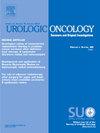THE ASSOCIATION BETWEEN RACE/ETHNICITY AND TRUST IN SOURCES OF CANCER INFORMATION IN PATIENTS WITH UROLOGIC CANCERS
IF 2.4
3区 医学
Q3 ONCOLOGY
Urologic Oncology-seminars and Original Investigations
Pub Date : 2025-03-01
DOI:10.1016/j.urolonc.2024.12.027
引用次数: 0
Abstract
Introduction
Where patients seek and obtain information regarding their cancer likely influences cancer care and treatment. Strategies to improve health communication and interventions rely on understanding variation in trust in sources of health information across populations. In this study, we evaluated the association between race/ethnicity and trust in different sources of cancer information.
Methods
We performed a cross-sectional analysis of the Health Information National Trends Survey – Surveillance, Epidemiology, and End Result (HINTS-SEER), a representative survey with respondents sampled from 3 SEER registries. We identified respondents with urologic cancers weighted to represent approximately 100,000 patients. Our primary outcome of interest was trust (A lot, Some, A little, None) in each of five sources of cancer information (doctor, family/friends, government health agencies, charitable organizations, and religious organizations). Survey weighted ordinal logistic regression was performed to test the association between race/ethnicity and trust in the five sources of cancer information
Results
We identified 348 survey respondents with urologic cancers including prostate (n=282), kidney (n=41), and bladder (n=25). Most respondents indicated "A lot" for trust in doctors (82.7%), "Some" for trust in government (50.7%) and charitable organizations (41.6%), "A little" for trust in family (42.1%), and "None" for trust in religious organizations (49.4%). On survey weighted analysis, the represented cohort consisted of 78.0% non-Hispanic White, 10.2% Hispanic, 6.3% Asian, 4.6% non-Hispanic Black, and 0.9% Other. On ordinal regression analysis, those who identified as Non-Hispanic Other were significantly less likely to trust doctors. Those who identified as Asian were more likely to trust friends and family and less likely to trust government agencies (Table 1).
Conclusions
Trust in sources of cancer information varies by race/ethnicity. A better understanding of this dynamic may guide strategies to optimize health communications and interventions and improve dissemination of critical cancer treatment and policy information for certain populations.
种族/民族与泌尿系统癌症患者对癌症信息来源的信任之间的关系
患者在哪里寻求和获得有关其癌症的信息可能会影响癌症的护理和治疗。改善卫生沟通和干预措施的战略依赖于了解不同人群对卫生信息来源的信任差异。在这项研究中,我们评估了种族/民族与对不同癌症信息来源的信任之间的关系。方法我们对卫生信息国家趋势调查-监测、流行病学和最终结果(HINTS-SEER)进行了横断面分析,这是一项代表性调查,受访者来自3个SEER登记处。我们确定了患有泌尿系统癌症的受访者,加权后代表大约10万名患者。我们感兴趣的主要结果是对五个癌症信息来源(医生、家人/朋友、政府卫生机构、慈善组织和宗教组织)的信任(很多、一些、一点、没有)。采用调查加权有序逻辑回归来检验种族/民族与五种癌症信息来源之间的关系。结果我们确定了348名泌尿系统癌症患者,包括前列腺癌(n=282)、肾癌(n=41)和膀胱癌(n=25)。大多数受访者对医生的信任度为“很多”(82.7%),对政府的信任度为“一些”(50.7%),对慈善机构的信任度为“一些”(41.6%),对家庭的信任度为“一点”(42.1%),对宗教组织的信任度为“没有”(49.4%)。在调查加权分析中,所代表的队列包括78.0%的非西班牙裔白人、10.2%的西班牙裔、6.3%的亚洲人、4.6%的非西班牙裔黑人和0.9%的其他人群。在有序回归分析中,那些被认定为非西班牙裔的人明显不太可能信任医生。那些被认为是亚洲人的人更可能相信朋友和家人,而不太可能相信政府机构(表1)。结论对癌症信息来源的信任因种族/民族而异。更好地了解这一动态可以指导优化卫生沟通和干预措施的战略,并改善对某些人群的关键癌症治疗和政策信息的传播。
本文章由计算机程序翻译,如有差异,请以英文原文为准。
求助全文
约1分钟内获得全文
求助全文
来源期刊
CiteScore
4.80
自引率
3.70%
发文量
297
审稿时长
7.6 weeks
期刊介绍:
Urologic Oncology: Seminars and Original Investigations is the official journal of the Society of Urologic Oncology. The journal publishes practical, timely, and relevant clinical and basic science research articles which address any aspect of urologic oncology. Each issue comprises original research, news and topics, survey articles providing short commentaries on other important articles in the urologic oncology literature, and reviews including an in-depth Seminar examining a specific clinical dilemma. The journal periodically publishes supplement issues devoted to areas of current interest to the urologic oncology community. Articles published are of interest to researchers and the clinicians involved in the practice of urologic oncology including urologists, oncologists, and radiologists.

 求助内容:
求助内容: 应助结果提醒方式:
应助结果提醒方式:


